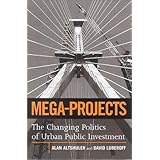
Average Reviews:

(More customer reviews)Are you looking to buy Mega-Projects: The Changing Politics of Urban Public Investment? Here is the right place to find the great deals. we can offer discounts of up to 90% on Mega-Projects: The Changing Politics of Urban Public Investment. Check out the link below:
>> Click Here to See Compare Prices and Get the Best Offers
Mega-Projects: The Changing Politics of Urban Public Investment ReviewAltschuler and Luberoff provide an in-depth analysis of urban mega-projects focusing on three major categories: highways, airports, and rail transit. They preface their treatment a first-rate discussion and analysis of the theoretical framework and evolving political context in which urban mega-projects are undertaken. In this sense, the book is invaluable for those persons in the project management sector who need to be able to deal with the politics of their own projects (despite the ongoing belief among students that politics are irrelevant to project success). The real driver of these projects is the demand for economic growth and prosperity by important political constituencies, particularly the business communities of these various cities, but also other groups (including neighborhoods and other local institutions) that are interested in promoting prosperity as well. The discussion here is balanced, thoughtful, informed and astute.The authors detail the era of carte-blanche and laissez-faire mega projects which lasted into the late 1960s, only to be confronted with resistance to groups (such as neighborhoods and environmentalists) that had heretofore been shut own, silenced, or overlooked. They treat the seventies, eighties and nineties as a time of retrenchment, and see the present era as one in which mega-projects will continue to drive forward in specific areas, but in which they will also be far more limited in scope than in the preceding years. They note the constraining force of the "do no harm" doctrine, and detail how this doctrine--promulgated as a consequence of the excesses of the mega-projects of the sixties, when neighborhood and environmental impacts were hardly ever considered (e.g., the ill-fated Jones Falls Expressway in Baltimore, which the book does not mention)--is being implemented in projects such as the Federal government's reconstruction and expansion of the Woodrow Wilson Bridge on Washington DC's southern edge.
The book ends with an analysis of the long-term impact of the legal retrenchment against mega-projects that occurred during the sixties, and its authors, while sympathetic with the democratic political tendencies generated by the opposition to these projecs, concludes that legitimate objections can still stop projects. Simple use of delaying tactics will not work, and projects will advance against such opposition, though far more slowly and with greatly increased costs.
Their discussion of regime politics is especially important, and provides and essential caveat for any serious professional or activist seeking to halt a politically advanced, though publicly deleterious project.Mega-Projects: The Changing Politics of Urban Public Investment OverviewIn "Mega-Projects", Altshuler and Luberoff examine the forces that gave rise to a great wave of urban mega-projects in the US in the 1950s and 1960s, that broke this wave in the years around 1970 and that have shaped a new generation of such projects in the decades since. While focusing principally on transportation mega-projects such as Boston's Central Artery/Tunnel project (the "Big Dig"), the Denver International Airport and the Los Angeles subway, they consider as well the scores of new stadiums, arenas and convention centres built (mainly at public expense) in recent years. "Mega-Projects" includes narratives of both national policy-making and local mobilization to bring about highway, airport, rail-transit and downtown revitalization projects, particularly since the 1970s. The specific projects chronicled are drawn from numerous regions including Boston, Denver, Los Angeles, New York City, Chicago, Atlanta, Dallas, Portland and Seattle. It also includes broad analyses, seeking to place the authors' findings in relation to leading theories of urban and American politics.
Want to learn more information about Mega-Projects: The Changing Politics of Urban Public Investment?
>> Click Here to See All Customer Reviews & Ratings Now